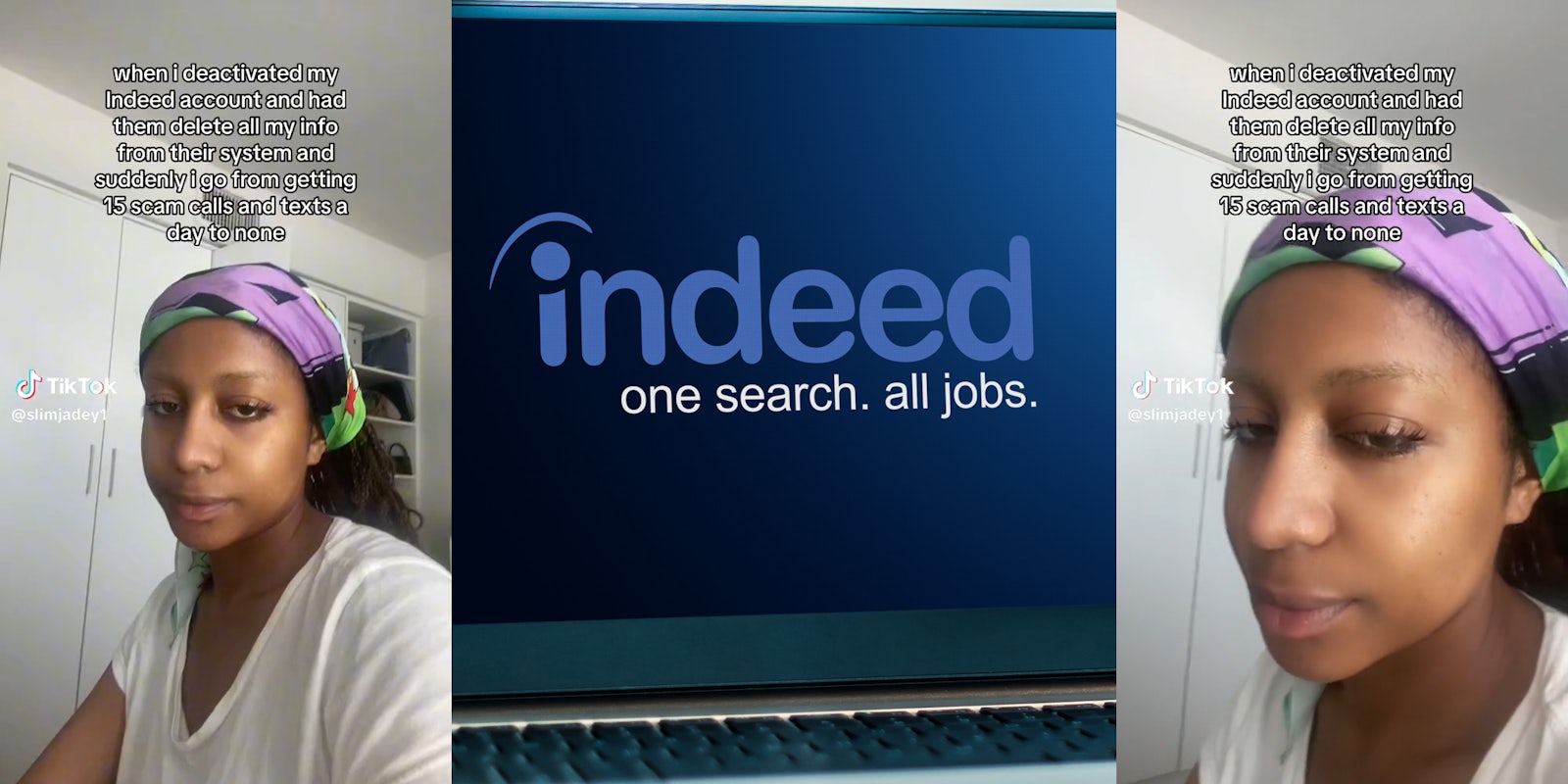For many people, the one person they can rely on to call them consistently isn’t a loved one, but a familiar name that glows up on their phone’s screen every so often—“Scam Likely.”
Joking aside, with different companies selling users’ private data on a daily basis, it’s difficult to know who is responsible for getting your number placed on a robocall list.
A TikToker named Jade (@slimjadey1) believes she was able to get to the root of all her spam calls in a viral clip that amassed over 283,000 views as of Friday—and she claims it all goes back to Indeed.
The job search site clocks in hundreds of millions of unique visitors every month, and many folks use the site’s “easy apply” option to submit themselves to be considered for a role. However, Jade thinks that Indeed may be farming out users’ personal data after noticing a severe drop in the number of spam calls she received upon deactivating her Indeed account.
@slimjadey1 just an observation #indeed #linkedin ♬ Ludwig Van Beethoven On Tour – SBH 
Jade writes in a text overlay of her video, “When i deactivated my Indeed account and had them delete all my info from their system and suddenly i go from getting 15 scam calls and texts a day to none.”
She isn’t the only social media user who noticed a massive uptick in spam/solicitation calls after updating their information to include their phone number.
Redditor @Ceptiion uploaded a post to the site’s r/recruitinghell titled “Can confirm Indeed is selling user information,” delineating a scenario that is nearly identical to the one that Jade outlined in her viral clip.
@Ceptiion writes, “Had the same phone number for years. No issues, not maybe less than 24 hours after updating it on Indeed and have been getting active daily spam calls for the last week. Usually 1 so it’s not ridiculous (just yet). Initially I thought it was a one-off. So I paid close attention to the last week and now I’m sure of it. Only place I changed and updated my phone number was indeed.”
According to Indeed’s privacy policy, it seems that the website withholds the right to sell or license any of the content that users publish to its platform. The language that is used in article 3 is “License to User Content and Feedback” appears to take all-encompassing verbiage that could be applied to a wide variety of different user content that’s uploaded to the platform, stating:
“When you provide User Content you grant Indeed a license to use it. Specifically, you grant Indeed a nonexclusive, worldwide, perpetual, (revocable only as described below), fully paid, royalty-free, transferable, sublicensable (through multiple layers of sub-licensees) right and license to make, use, sell, sublicense, reformat, reproduce, distribute, perform, display, prepare derivative works from and otherwise exploit all User Content you post or submit, for the purpose of publishing material on the Indeed website or its publishers or third party sites…”
It seems the more one reads the privacy policy, the more it seems like any and all user content could be used for whatever purposes Indeed sees fit: “maintaining or improving the Indeed website (including without limitation for the purposes of training a model that recommends content to other users), and promoting Indeed and such User Content without restriction. No compensation in any form shall be due or payable to you in connection with Indeed’s exercise of its rights under the license granted under this Section.”
Interestingly enough, it is expressly against Indeed’s user policy for individual users to sell personal information on the site.
So, what’s a job seeker to do? Well, if you have a Gmail account, the first thing you could do is sign up for a Google Voice number associated with that account and turn all of your voice notifications off. The application comes with visual voicemail so you can get a gist of what the voicemails left on the account are about and if it’s from a legitimate job recruiter, you can call them back with your actual phone number, or keep things through Google Voice until you’re sure they’re legitimate. Any other “Burner” phone number applications could also work.
Viewers who watched Jade’s video said that they too had a similar experience after signing up with Indeed. One user wrote, “No cuz now that i think about it i [didn’t] start getting spam emails until i signed up for indeed.”
Another wrote that popular applications aren’t even hiding the fact that they’re selling user data anymore, writing, “OH! so I asked a caller about this trying to sell my company something and they get info from LinkedIn, indeed, and also Zoom.”
“Wait literally just started up a job search again and using indeed and bunch. For the past week I’ve been getting like 4 scam calls a day,” someone else penned.
Someone else said applying for new positions through services like Indeed is ultimately just a bad idea.
“This is why you apply directly on the company’s website and read their job descriptions,” they advised.
The Daily Dot has reached out to Jade via TikTok comment.


